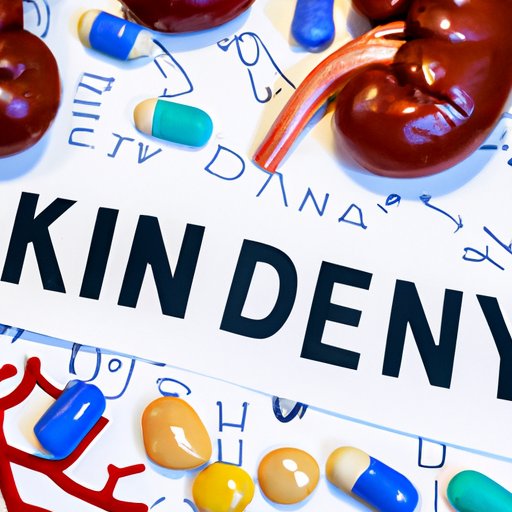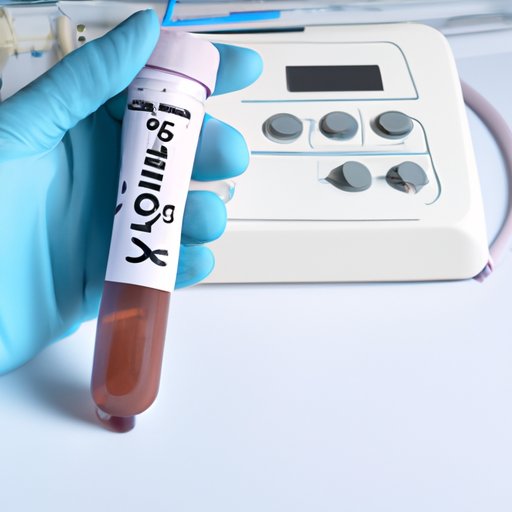
I. Introduction
Our kidneys are important organs that play a vital role in our body’s overall health. Kidney disease is a serious condition that can lead to kidney failure and other serious health problems. It is important to detect kidney disease early to be able to keep it from progressing and causing damage. This article will explore how you can tell if your kidney is bad and what steps you can take to prevent and manage kidney disease effectively.
II. Signs and Symptoms of Kidney Disease
Signs of kidney disease may not appear until the disease is advanced. Here are some common signs and symptoms to look out for:
- Changes in urine frequency or amount
- Blood in urine
- Foamy urine
- Puffy eyes or swelling in hands, feet, or ankles
- Fatigue or weakness
- Nausea or vomiting
- Loss of appetite or food taste
- Itchy skin or dry skin
- Difficulty concentrating or thinking clearly
If you are experiencing any of these symptoms, it is important to talk to your physician. These symptoms do not always mean you have kidney disease, but they could be warning signs.
III. Risk Factors for Kidney Disease
There are several common risk factors for kidney disease, including:
- High blood pressure
- Diabetes
- Family history of kidney disease
- Age 60 or older
- Smoking
- Obesity
If you are at risk, it is important to monitor your kidney health regularly and make lifestyle changes to reduce your risk.

IV. Lab Tests for Assessing Kidney Function
Several lab tests can assess your kidney function. Your doctor may order one or more of the following tests to check your kidneys:
- Blood tests
- Urinalysis
- Urine albumin test
- Glomerular filtration rate (GFR)
Your doctor will explain what each test measures and what you should expect. You will likely need to prepare for some of these tests with fasting or abstaining from certain medication usage.
V. Lifestyle Changes to Reduce Risk
Making lifestyle changes can go a long way in preventing and managing kidney disease. Here are some practical tips:
- Eat a healthy diet low in sodium, saturated fats, and sugars
- Maintain a healthy weight
- Exercise regularly
- Avoid smoking and limit alcohol intake
- Stay hydrated by drinking enough water
VI. Treatment Options for Kidney Disease
There are several treatment options available for kidney disease, depending on the severity of the disease. They include:
- Medications to control blood pressure and manage diabetes
- Dialysis – a method of removing waste products from your blood artificially
- Kidney transplant – replacing the damaged kidney with a healthy one
Your doctor will advise which treatment option is best for you based on your medical history, overall health, and the stage of kidney disease you have.
VII. Prevention Tips for Kidney Disease
Preventing kidney disease is always better than treating it. Here are some practical tips to prevent kidney disease:
- Control blood sugar levels if you have diabetes
- Manage your blood pressure
- Avoid over-the-counter pain medications like acetaminophen, ibuprofen, or aspirin
- Talk to your doctor if you have a family history of kidney disease
VIII. Self-Care for Kidney Disease
Managing kidney disease requires self-care. Here are some essential self-care strategies for managing kidney disease:
- Follow your doctor’s instructions and take medications as prescribed
- Monitor your blood pressure regularly
- Maintain a healthy diet according to your needs and nutritional values
- Exercise regularly
- Manage your stress levels
IX. Conclusion
Kidney disease can be severe if not detected early. Watch out for early symptoms of kidney disease, and if you’re experiencing any of them, consult your doctor immediately. Knowing how to prevent and treat kidney disease are essential, as it can help you maintain your overall health better. By following good lifestyle habits, regularly monitoring your kidney function, and seeking medical assistance when you need it most, you can keep your kidneys healthy, and enjoy a healthier, happier life.




